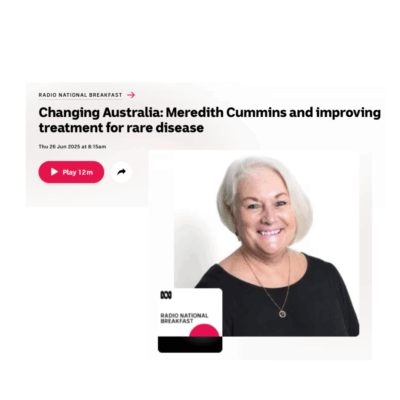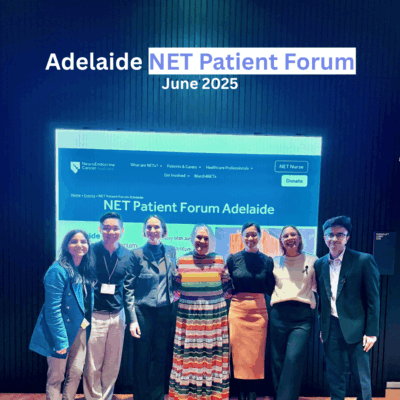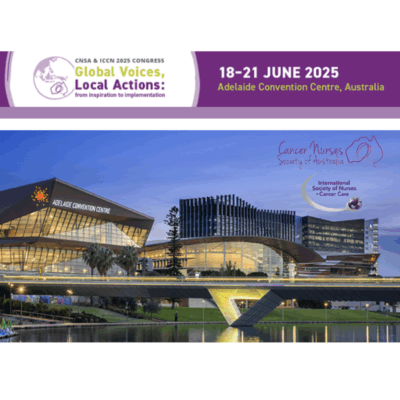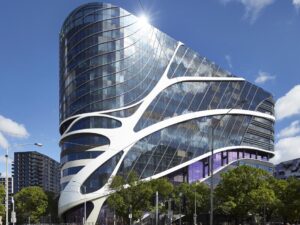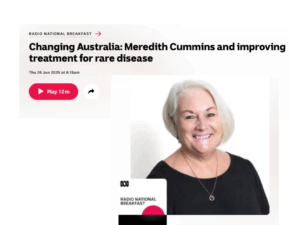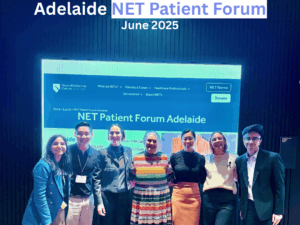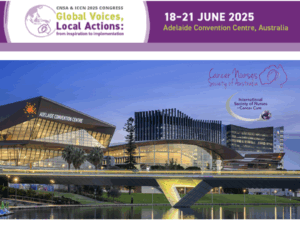Asia Pacific Neuroendocrine Tumor Society (APNETs) November
9-11 – by Simone Leyden
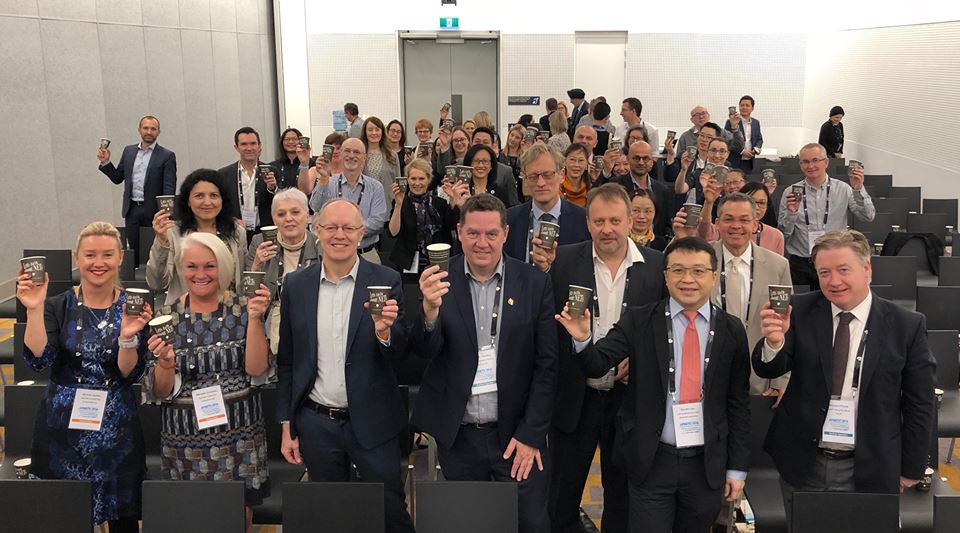
It was a great honour to play host to the 6th
annual Asia Pacific Neuroendocrine Tumour Society (APNETs) meeting in Melbourne
in November at the Melbourne Exhibition and Convention Centre (9th –
11th). APNETs, founded in 2013 by a group
of healthcare professionals who recognized the need for the creation of a
regional society dedicated to enhancing the care of patients with
neuroendocrine tumours.
With close to 200 registrants representing over 19 countries,
APNETS 2018 will go a long way in spreading and integrating NET research
amongst the Asia-Pacific Region and beyond.
This year’s scientific program bought together experts from
around the world in all disciplines of NET patient care, who presented the most
up to date research, clinical trials, guidelines, treatment options and
diagnostics. It was unique that every one of the invited speakers accepted our
invitation, and we are so grateful to the experts who shared their knowledge
over the three days, finishing with the patient symposium. We were happy to
have leading experts including Prof Dermot O’Toole the Chair of the European
Neuroendocrine Tumor Society (ENETs), the President of APNETs Dr Harjit Singh,
Dr Anita Borges (India), Dr Ben Lawrence (New Zealand), Prof James Yao (USA),
Prof Halfden Sorbye (Norway), Prof Anthony Gill AM (Australia) and Dr Simona
Glasberg (Israel), to name but a few. Below is a snapshot of the program and
what was presented with more details and published abstracts attached for review.
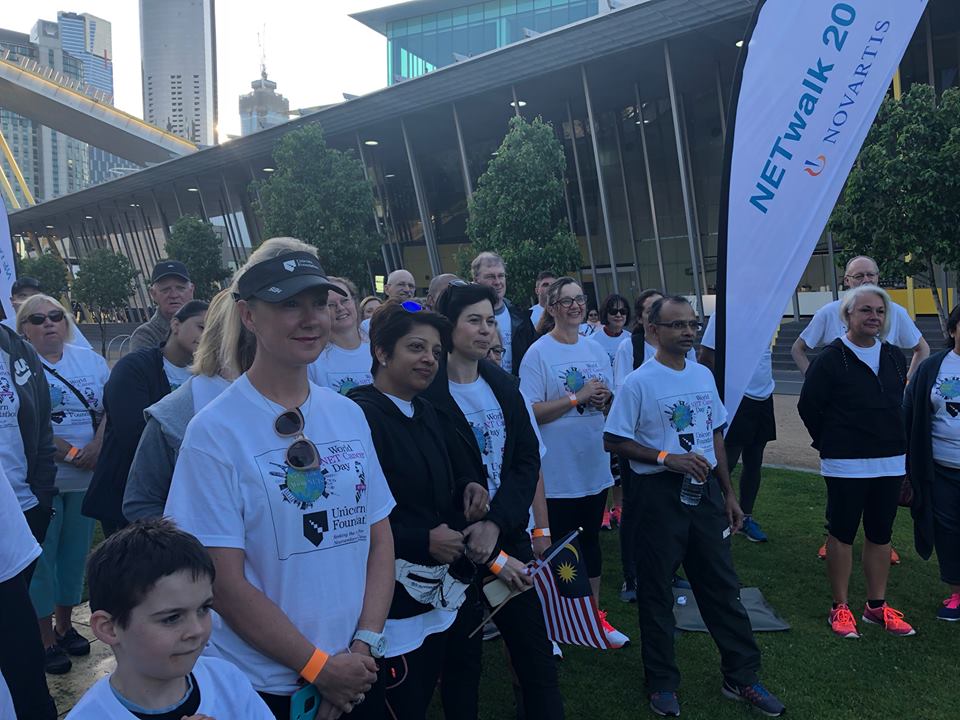 World NET Cancer Day on Saturday November 10 (the second day
World NET Cancer Day on Saturday November 10 (the second day
of the meeting) started with an early walk, “NETwalk”, organised in conjunction
with our Gold sponsor Novartis. It was great to see so many of the attendees of
APNETs as well as patients and families join in for a leisurely walk around
Melbourne, a great way to start day two and World NET cancer Day.
As well as a program filled with the latest research and
clinical trials in NETs, we also enjoyed a history lesson during the IPSEN
breakfast session with “N.E.T – Connecting the last 110 years”. The interactive
panel of NETs”.
Special thanks to Prof Rod Hicks and Dr Grace Kong of Peter
MacCallum Cancer Centre, who did an exemplary job with the scientific program.
Their dedication is second to none and worked tirelessly to bring the program
together. Thanks also to the team at ASN Events lead by Jim Fawcett who once
again pulled together the event with ease and commitment.
 We would not have been able to hold the meeting without the
We would not have been able to hold the meeting without the
commitment of our sponsors, thank you to our gold sponsor Novartis, Bronze
Sponsors IPSEN, TELIX, CYCLOTEK, supporters AAA, Clarity, Compete ITM, and
exhibitors ANSTO, IDB, Imaxeon, Iphase, and Merck. It is exciting to see the
interest in the NET space and we look forward to working with our partners in
future research.
APNETs above all, was an incredible opportunity to network,
share ideas and motivate as we all strive to improve NET patient outcomes. We
look forward to the many projects inspired by the meeting and working together
further in the future.
Day One – Why Should I Suspect NETs?
Prof James Yao (MD Anderson Cancer Centre, United States)
An update on the
evolving epidemiology, biology and prognosis of neuroendocrine neoplasms
Although much have
been learned about the biology and natural history of neuroendocrine neoplasms
over the past two decades, our understanding of these topics is still evolving
due to continuing improvements in molecular diagnostics and therapeutics. Our
recent analyses using Surveillance, Epidemiology, and End Results (SEER)
registry data showed the incidence and
prevalence of neuroendocrine tumors are continuing to rise (Dasari et al,
JAMA Oncology 2017).
Dr Simona Glasberg (Hadassah-Hebrew University Medical
Centre, Israel)
Endocrine Features of
NETs
The natural history of
patients with neuroendocrine neoplasms (NENs) is characterized by pronounced
interpatient heterogeneity. This clinical variability reflects the diverse biology of NENs that show a
wide spectrum of cell differentiation, proliferation, and invasiveness. A major
determinant of the clinical course is
attributed to the increased production and secretion of a multitude of
neuropeptides and amines that cause distinct clinical syndromes.
Over-secretion of a single hormone (functioning tumor) or absence of any
hormonal over-secretion (non-functioning tumor) are the two most common
clinical scenarios observed in NENs patients with sporadic disease.
Day One – Diagnosis of NETs
Prof Michael Hofman (Peter MacCallum Cancer Centre,
Australia)
Molecular imaging in
diagnosis and treatment planning
Molecular imaging is
changing diagnostic and treatment paradigms in patients with neuroendocrine
tumors through its ability to non-invasively characterize disease,
supplementing the traditional role of using imaging for localizing and
measuring disease. For patients with metastatic disease, there is an increasing
range of therapies but these must be individualized to the specific subtype of
tumor expressed, which varies in aggressiveness from well to poorly
differentiated phenotypes. Positron emission tomography (PET) is now able to
characterize these subtypes through its ability to quantify somatostatin
receptor cell surface (SSTR) expression and glycolytic metabolism with SSTR and
fluorodeoxyglucose (FDG) PET, respectively.
Day One – What patients want to know?
Prof Michael Jefford (Peter MacCallum Cancer Centre,
Australia)
Survivorship
considerations for people with NETs
There is little
literature that specifically deals with the concerns and issues experienced by
people living with and beyond a diagnosis of NET (that is, survivors). Limited
extant data suggests that NET survivors experience many issues that are similar
to other survivor groups, including physical concerns, such as fatigue and
pain; emotional issues, such as fear of cancer spreading, uncertainty about the
future, and depression; altered relationships; financial concerns; role and
lifestyle changes, and changes in work. They may also experience unique symptom
issues, including diarrhoea, cramping and breathlessness. These issues need to
be identified and appropriately managed.
Survivors frequently encounter inexperienced health care professionals
and poor communication between providers, resulting in suboptimal care. As with
other survivor groups, consideration should be given to models of care that may
not be medically led or face-to-face. These might include greater use of
nurse-led review and better integration with primary care, as well the use of
phone and internet-based reviews, and remote monitoring. Many providers
(including primary care practitioners) likely lack the information and guidance
necessary to adequately care for survivors.
Preliminary data suggests that NET survivors value survivorship care
plans (SCPs). SCPs have been endorsed internationally. They include a summary
of diagnosis and treatments, recommended follow up, and strategies to remain
well.
Dr Erin Kennedy (Peter MacCallum Cancer Centre,
Australia)
Nutritional aspects,
including short gut syndrome
The pathophysiology of
neuroendocrine tumours and their treatment can cause various symptoms with the
potential to impact on nutritional factors such as vitamin synthesis and
absorption, dietary habits, weight change and appetite. Patients with serotonin
producing NETs and those on somatostatin analogue treatment are a risk of malabsorption
syndromes, leading to potential deficiency in fat-soluble vitamins and niacin.
Bowel resection leads to additional risk of malabsorption and malnutrition.
Malnutrition and dietary modification is prevalent in NET patients, with up to
40-90% of patients reporting food intolerances or changing their diet to manage
symptoms. Recent research has indicated that up to 38% of NET patients are at
nutritional risk. Diarrhoea, flushing, abdominal pain and bloating are symptoms
commonly misdiagnosed in NET patients, and have a significant impact on
patients’ quality of life. Common nutrition issues reported by NET patients
will be discussed, as well as recommendations for suitable screening and
management practices.
We look forward to attending and contributing more to the
important work of the global NET medical societies, and grateful to the
partnership between patient advocates and medical experts as we all strive for
better outcomes for NET patients.


